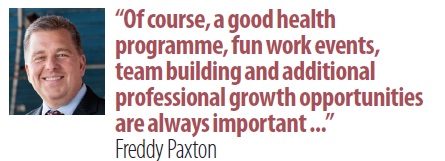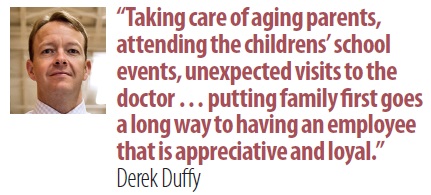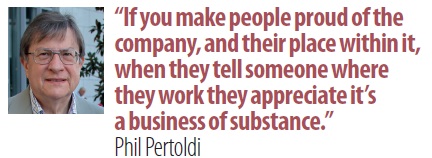How the industry deals with staff retention, by Steve Jordan


The Mover recently received a submission from Martin Giles from Armstrong in Canada describing on-road staff as superheroes (read it here). Few would argue with his assessment, but it got me thinking. The moving industry isn’t traditionally particularly well paid. So, without the opportunity of crossing their palms with gold, how do companies keep hold of these people who are so vital to their success?
It is well known that money isn’t a great motivator anyway. Not long term. The promise of a bonus might encourage someone to put in a little more effort temporarily, but that’s not quite the point. The trick is to make staff want to perform well – all the time.
So, I asked around. It wasn’t a bright thing to do, not right in the middle of the silly season, so I am very grateful to those who took the time to respond with their words of wisdom.
 Freddy Paxton, from The Paxton Companies in the USA said that his company takes cultural diversity very seriously and they take a special pride in the diversity of their teams. He believes that this philosophy helps the company see the big picture and keeps the teams together. “Of course, a good health programme, fun work events, team building and additional professional growth opportunities are always important,” said Freddy, “along with competitive pay and retirement options.”
Freddy Paxton, from The Paxton Companies in the USA said that his company takes cultural diversity very seriously and they take a special pride in the diversity of their teams. He believes that this philosophy helps the company see the big picture and keeps the teams together. “Of course, a good health programme, fun work events, team building and additional professional growth opportunities are always important,” said Freddy, “along with competitive pay and retirement options.”
Freddy also spoke of a chap called William ‘beep’ Horne who worked for the company for 55 years, longer even than the founder (why he’s called ‘beep’ he didn’t explain). “Beep just retired a few years ago, but that has always been our goal, to help people and families grow with Paxton. We have an award called the ‘beep’ Horne award for those employees who have over 30 years plus with Paxton. The plaque currently has over 30 people on it. That says something about our longevity.” Indeed it does Freddy.
MT Rajah, General Manager from PT Kellys Express in Jakarta offered some thoughts too. Rajah agreed that it is the staff at the floor level who are the backbones of the business. He said that the relationship between management and staff is very important, especially when dealing with customers’ personal possessions when honesty and integrity are essential. “This requires a sense of loyalty and openness with your staff and, above all, a pat on the back,” he said. “To make staff feel at home is to genuinely make them as part of the family.”
Creating that family feel requires a level of engagement with their culture, participating in their religious rites, weddings, funerals and hospital visits. “Above all you need to give them your time, show a genuine interest in them, and share the company’s ups and downs. This method has worked for us and the staff turnover is only 3% in 12 years.”
 Derek Duffy, also from Armstrong, shares a different approach. “We invest in our facilities to create an environment that our moving teams are proud of,” he explained. “A place where they feel comfortable. We have drivers that are based all across Canada. When they come to our head office in the suburbs of Toronto, our objective is to make them feel as comfortable as they feel at their own home. We offer shower facilities, sleeping quarters, a TV lounge with reclining chairs. We have the utmost respect for the work they do, on the front lines, in the homes of our customers. They are the face of the company. We treat our moving teams the way we want them to treat our customers.” Derek added that his company continually invests in its fleet so the teams are working with the newest, safest equipment available.
Derek Duffy, also from Armstrong, shares a different approach. “We invest in our facilities to create an environment that our moving teams are proud of,” he explained. “A place where they feel comfortable. We have drivers that are based all across Canada. When they come to our head office in the suburbs of Toronto, our objective is to make them feel as comfortable as they feel at their own home. We offer shower facilities, sleeping quarters, a TV lounge with reclining chairs. We have the utmost respect for the work they do, on the front lines, in the homes of our customers. They are the face of the company. We treat our moving teams the way we want them to treat our customers.” Derek added that his company continually invests in its fleet so the teams are working with the newest, safest equipment available.
“Our core values at Armstrong are RAFT: Responsiveness, Accountability, Family and Training. We are all in the RAFT together. Stronger together, than we are as individuals.” Derek said the company accepts that families take responsibility so a good work/life balance is important. “Taking care of aging parents, attending the children’s school events, unexpected visits to the doctor … putting family first goes a long way to having an employee that is appreciative and loyal.”
Geoff Watson from Doree Bonner in the UK takes a more direct approach. “Pay the correct rate; give staff the right tools to do the job; provide good quality, modern uniforms and give them enough so they can change them every day; and staff jobs correctly, which of course means you have to cost and price jobs correctly.” Geoff added that it is important to provide good facilities including showers, clean toilets and a well-equipped mess room.
“It’s important to make sure they understand that management really cares about service and the customer,” he said. “There should be regular meetings with staff in which you can listen to their ideas and complaints and act upon them, whether positively or negatively, but don’t ignore them. Discipline when necessary but praise when it is earned.”
Geoff believes that the image of the industry doesn’t help recruitment and retention. “We need to regulate the industry even more to wipe out those companies who still accept cash from customers, pay operative staff in cash, treat their operative staff appallingly, give the industry a poor reputation which in turn gives the general public and potential employees a very poor opinion of our industry.”
Miguel Angel Florez Palacios from Aviomar in Colombia said that physical labour is not an attractive way to earn a living for many young people. He said that people are looking for opportunities in ‘soft skills’, so the problem is how we should retain people in a more ‘old fashioned’ role. “You need to develop a real career for them,” he said. His company offers training in a range of skills, including English and IT, and offers a virtual scholarship of 50% if they pass. “So I would say creativity is the most powerful tool that you have. They want a win-win deal.”
 Finally I disturbed Phil Pertoldi, Chairman of Abels Moving Services in the UK, from his summer madness to offer a totally different view from the UK.
Finally I disturbed Phil Pertoldi, Chairman of Abels Moving Services in the UK, from his summer madness to offer a totally different view from the UK.
He said that the first step is to recruit well. New recruits rarely appreciate the rigours of the job no matter how carefully they are explained at interview. It’s better, therefore, to recruit from relatives or friends of existing employees as they already appreciate what’s involved. Abels is also justifiably proud of the number of apprentices it has trained from scratch through its in-house training school.
“It’s about taking on young staff and training them in the culture of the business and their behaviour,” said Phil. “If you make people proud of the company, and their place within it, so when they tell someone where they work they appreciate it’s a business of substance.”
In that respect Abels has a lot to offer. As well as the Royal Warrant it was the first moving company to have the Investors in People (IIP) Standard; it sets high standards of dress, including ties; and has a high-quality vehicle fleet, materials and equipment, and a renowned historic vehicle fleet to underline the company’s pedigree. “Managers are known by their Christian names and we have an open-door policy and access to mobiles to discuss issues as they occur,” said Phil. “Management also have been hands on, so are not asking staff to do something they have not done themselves.”
This year Abels invited employees to a team development programme specifically designed for the company to help build trust and respect between colleagues through outdoor activities. “The positive motivation that came from these courses was palpable throughout the company, bringing a spring to the step of all who took part,” said Phil.
Some might say that staff retention is difficult. Others would say it’s fun. You can make it as hard or as easy as you like. For me, a good place to start might be Dale Carnegie who in his world-famous book How to win friends and influence people said you should “be hearty in your approbation and lavish in your praise”. Dale never used one word when a couple of dozen would do. I prefer just to say “Thank you”.